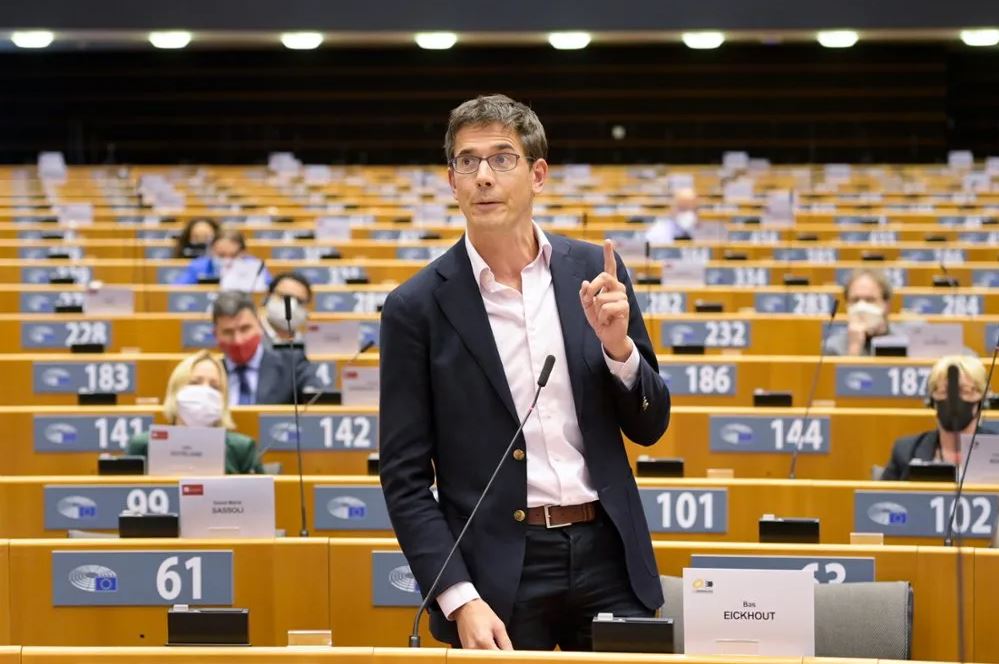European Parliament member calls for bans on F-gases in refrigeration and ACs from 2024-2027
October 19, 2022

In an opinion on the revision of the EU F-gas Regulation, Member of the European Parliament (MEP) Bas Eickhout calls for greater ambition than the European Commission (EC)’s proposal, through both bans on new refrigeration and air-conditioning equipment with fluorinated gases (HFCs and HFOs) between 2024 and 2027 and a more stringent HFC phase down.
Eickhout, a Dutch representative from the Group of the Greens/European Free Alliance (EFA), is the Rapporteur (MEP appointed to report on proceedings) for the Committee on the Environment, Public Health and Food Safety (ENVI), which is in charge of drafting the European Parliament’s position on the F-gas Regulation.
Eickhout, in his third term in the European Parliament, is vice-chair of the ENVI committee and has worked on the Parliament’s position during the negotiations leading to the current version of the regulation.
In his opinion, Eickhout proposed the following amendments concerning refrigeration equipment using fluorinated greenhouse gases (HFCs or HFOs):
- A ban on new self-contained refrigerators and freezers for commercial use that contain fluorinated greenhouse gases as of January 1, 2024.
- A ban on new stationary refrigeration equipment, that contains, or whose functioning relies upon, fluorinated greenhouse gases as of January 1, 2024.
- A ban on new domestic refrigerators and freezers that contain fluorinated greenhouse gases as of January 1, 2025.
- A ban on any new self-contained refrigeration equipment that contains fluorinated greenhouse gases as of January 1, 2025.
“Stationary refrigeration no longer requires the use of fluorinated greenhouse gases, as there is an abundance of natural refrigerant alternatives available,” states Eickhout in his opinion.
These bans are aligned with the growing European market uptake of systems relying on natural refrigerants, as described in ATMOsphere’s latest report on “Natural Refrigerants: State of the Industry” for commercial and industrial sectors in Europe. ATMOsphere is the publisher of this website.
Bans on f-gases in ACs and heat pumps
Eickhout also seeks to restrict the following new air-conditioning and heat pumps using fluorinated greenhouse gases (HFCs or HFOs):
- A ban on new plug-in room and other self-contained air-conditioning and heat pump equipment that contains fluorinated greenhouse by January 1, 2025.
- A ban on the following new stationary split air-conditioning and split heat pump equipment:
- Single split systems containing less than 3kg (6.6lbs) of fluorinated greenhouse gases listed in the Kigali Amendment’s Annex I (only HFCs), which contain, or whose functioning relies upon, fluorinated greenhouse gases, by January 1, 2025;
- Split systems of a rated capacity of up to and including 12kW (3.4TR) containing, or whose functioning relies upon, fluorinated greenhouse gases, except when required to meet safety standards, by January 1, 2027;
- Split systems of a rated capacity of more than 12 and up to 200kW (56.9TR) containing, or whose functioning relies upon, fluorinated greenhouse gases with GWP of 750 or more, except when required to meet safety standards, by January 1, 2027;
- Split systems of a rated capacity of more than 200kW containing, or whose functioning relies upon, fluorinated greenhouse gases, by January 1, 2027.
“Given the recent adoption of standard IEC-60335-2-40, the proposed ban in split systems up to 12kW can be met with propane (R290). In specific cases where this is not possible, the safety exception allows for some flexibility. In split systems above 200 kW, ammonia (NH3/R717) and CO2 (R744) are available alternatives,” explains Eickhout.
Finally, Eickhout introduces a ban on fluorinated greenhouse gases (HFCs and HFOs) in transport refrigeration and mobile air-conditioning as of January 1, 2027, due to the high leakage rates of these subsectors and poor end of life refrigerant recovery, in addition to the availability of alternatives.
Minichillers and displacement and centrifugal chillers are also banned from using fluorinated greenhouse gases (HFCs and HFOs) as of January 1, 2027.
HFC phase down and PFAS
Eickhout also recommends tightening the HFC phase down, opting for the schedule listed in the maximum feasibility scenario of the Impact Assessment (the EC’s economic assessment of the F-gas proposal), and reducing available quotas to zero as of 2049. In addition, he proposes a higher fee to maintain a stable stream of revenues from selling allowances. The fee would increase from €10 (US$9.8) per metric ton of CO2 e in 2024–2026 to €99.28 (US$97.2) from 2048 onwards.
Eickhout also considers the growing issue of PFAS, so-called “forever chemicals,” in the environment, stating that “in order not to repeat mistakes from the past, the rapporteur proposes to move several (sub)sectors, such as refrigeration, air conditioning, heat pumps and switchgear, to F-gas free alternatives.” Certain f-gases and their atmospheric degradation product trifluoroacetic acid (TFA) are considered to be PFAS by the Organisation for Economic Co-operation and Development (OECD).
ATMOsphere recently released a report on the growing threat of HFOs and TFA on human health and the environment.


